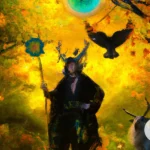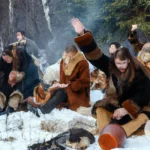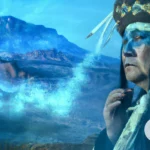African spirituality is rich with diverse traditions and practices that have been passed down through generations. One of the central elements in many of these traditions is shamanism. Shamanism is a spiritual practice that involves communicating with the spiritual world, including ancestors and spirits, in order to gain insight, healing, and guidance. The role of the shaman is integral in many African cultures, and this article aims to explore the origins and practices of African shamanism, the different types that exist, and the important role shamans play in their communities. Additionally, we will discuss the challenges and opportunities that African shamanism faces in modern times.
African Shamanism
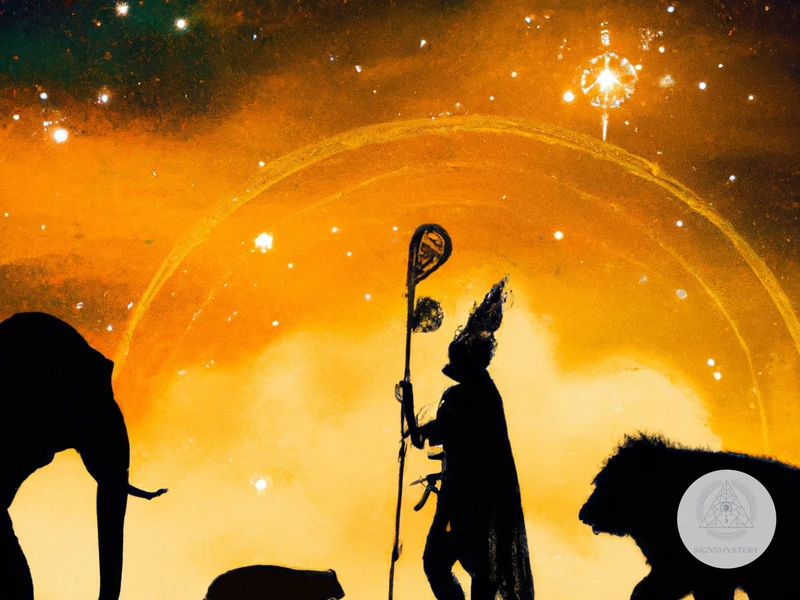
African Shamanism is a complex spiritual practice that has evolved over the centuries with deep roots in African culture and traditions. At the core of the African Shamanistic beliefs is the belief that everything in the world is interconnected and that spirits and ancestors play pivotal roles in everyday life. Shamanism in Africa has its own unique characteristics, distinct from other shamanic traditions such as shamanic beliefs of Native Americans, shamanism in ancient Egypt, Greece, and Rome, Central Asian Shamanism, Siberian Shamanism, Japanese Shamanism, and Australian Aboriginal Dreamtime Shamanism. Throughout history, African Shamans have used their gift of connecting with the spirit world to heal, provide guidance, facilitate spiritual protection and inner growth, and perform rites of passage. Today, despite the many challenges posed by colonialism, imperialism, and modernization, African Shamanism continues to evolve and reinvent itself in the face of renewed recognition and interest.
What is Shamanism?
Shamanism is a spiritual practice that has been around for thousands of years. The term ‘shaman’ comes from the Tungus tribe in Siberia and refers to a person who is able to enter a trance state to communicate with the spiritual realm. This spiritual realm is believed to be inhabited by various entities including ancestors, spirits, and deities. The shaman, through communication with these entities, is able to bring knowledge, healing, and guidance to their community.
Shamanism is not a single, organized religion but rather a collection of beliefs and practices that are present in many different cultures around the world, including African spirituality. Although the specific practices may vary from culture to culture, shamanism is generally characterized by the belief in the existence of an invisible world that is able to influence the physical realm. The shaman is the intermediary between these two realms and is able to harness the power of the spiritual realm for the benefit of their community.
Comparisons can be made to shamanic beliefs in Native American and Siberian cultures, as well as ancient cultures in Egypt, Greece, and Rome, Central Asian shamanism, Japanese shamanism and mythology, and shamanic traditions in Australian Aboriginal Dreamtime, as well as the spiritual practices in Western culture.
Origins of African Shamanism
It is believed that African Shamanism has its roots in ancient Animism – the belief that all objects and living beings possess a certain degree of consciousness and spiritual essence. Animism was practiced by many indigenous African tribes long before the arrival of Christianity and Islam. The practice of Shamanism was likely introduced by early tribes in Africa and was later integrated into many spiritual practices across the continent. In traditional African societies, the role of the Shaman is essential for connecting with the spiritual world and aiding the community in various ways. The Shaman serves as a healer, mediator, and spiritual guide. The Shaman communicates with the spiritual realm on behalf of the community and is believed to be able to travel between the spiritual and physical worlds.
African Shamanism is unique compared to other Shamanistic practices found in cultures around the world. While Shamanism found in Western culture or Native American Shamanism is dominated by male Shamans, women play a prominent role in African Shamanism. This is particularly true in West Africa, where female Shamans often take a central role in community healing and protection rituals.
Shamanism has adapted over time, with different African tribes applying Shamanistic practices in their own unique way. Despite this, there are certain elements that are common across many African tribes, such as ancestor worship, the use of drumming and dance in ritual, and the belief in the interconnectedness of all things.
It is essential to understand the importance of Shamanism in the context of African Spirituality. Although Shamanism is no longer the dominant spiritual practice in most of Africa, many African people still incorporate Shamanistic rituals and beliefs into their daily lives. Understanding the origins and significance of this practice is imperative for preserving Africa’s unique spiritual heritage.
African Shamanistic Practices
African Shamanistic practices involve a wide range of rituals and ceremonies aimed at achieving spiritual and physical healing, guidance, communion with spirits and ancestors, and protection from evil forces. One such practice is trance dance, which involves frenzied dancing to reach a state of trance and connect with spirits. Drumming, chanting, and the use of psychoactive plants, such as iboga and ayahuasca, are also common in African Shamanistic rituals.
Various divination techniques are used by Shamans to provide guidance and advice to their communities. One such technique is throwing the bones, where the Shaman throws a set of bones and interprets their positions to answer questions about the future. Another technique is cowrie shell divination, which involves throwing cowrie shells and interpreting their position to answer yes or no questions.
Another fundamental practice of African Shamanism is the use of herbal medicines for physical and spiritual healing. Shamans collect and prepare different herbs that possess medicinal or psychoactive properties. These herbs are used to cure different ailments, ranging from chest pains to mental disorders. It is believed that the use of herbal medicines strengthens the shaman’s connection to the spiritual world.
Finally, sacrifices and offerings play an essential role in African Shamanistic practices. They are offered to ancestors and spirits to request their assistance, protection, and guidance. For instance, animal sacrifices are commonly used to appease spirits, while offerings of food, liquor, and perfumes are used to gain their favor.
However, it is essential to note that African Shamanism is not a single homogenous tradition, but rather a diverse set of practices that vary across the continent. Nevertheless, they all share the belief that the spiritual world is interconnected with the physical world, and humans should live in harmony with nature and other beings. The role of African Shamanism in promoting this eco-spiritual worldview is crucial and increasingly being recognized by Western cultures as well- /shamanism-western-culture/.
Importance of Ancestors and Spirits
In African spirituality, ancestors and spirits hold great significance. Ancestral worship is central to many African cultures, and it is believed that the ancestors play an active role in the lives of their descendants. Ancestors are seen as benevolent and protective spirits who can intervene in the lives of their living family members. They are revered as sources of wisdom, guidance, and protection.
Ancestral veneration involves the use of rituals and ceremonies that honor the dead and seek their blessings. It is believed that by offering gifts and sacrifices to the ancestors, they will be pleased and will in turn bless their living relatives. Ancestors are also believed to be able to offer protection and bring good fortune to their descendants.
In addition to ancestors, African spirituality also places a great deal of importance on other spiritual beings, such as spirits of the land and nature. These spirits are believed to inhabit natural features such as mountains, rivers, and trees, and they are often recognized as powerful forces that can bring either blessings or curses to those who interact with them.
In African spirituality, communication with these spirits is achieved through the use of divination and trance inducing practices, such as drumming, dancing, and chanting. This is done to achieve a state of altered consciousness where one can communicate with the spiritual realm and receive guidance and wisdom from the spirits.
The importance of ancestors and spirits in African spirituality is a testament to the belief that the world is interconnected and that humans are not the only beings with agency and power. Through the recognition and veneration of ancestors and spirits, African spirituality emphasizes the importance of respect for all of creation, and a recognition of the role that non-human beings play in our lives.
Types of African Shamanism
African shamanism is a complex and diverse set of beliefs and practices that vary across the continent. Among the most well-known types of African shamanism are West African shamanism, Central African shamanism, South African shamanism, and East African shamanism. Each of these types has its own unique characteristics and traditions, but all share a belief in the power of spirits and ancestors to influence the physical and spiritual world. West African shamanism, for example, is characterized by its colorful costumes and powerful drumming rituals. In Central Africa, shamanism often emphasizes the role of the individual in healing and spiritual development. South African shamanism is known for its use of dance and trance-like states to achieve spiritual insights, while in East Africa shamanism is focused largely on divination and guidance. Despite their differences, each type of African shamanism plays an important role in preserving cultural identity and promoting spiritual growth and well-being.
West African Shamanism
West African Shamanism is one of the oldest and most influential shamanistic traditions in Africa. It encompasses the spiritual practices of various ethnic groups, such as the Yoruba, Igbo, and Akan people. In West African Shamanism, the shaman is known as a Babalawo, meaning “Father of Mysteries.”
Here are some highlights of West African Shamanism:
- Diverse Beliefs: West African Shamanism is a rich and diverse system of spiritual beliefs. It incorporates a variety of elements, including ancestor veneration, divination, herbal medicine, and psychic healing.
- Orisha Worship: The Orishas are a group of deities worshipped in West African Shamanism. Each Orisha has its unique personality, powers, and responsibilities. They are seen as intermediaries between human beings and the Supreme Being.
- Divination: Divination is a crucial component of West African Shamanism. Babalawos utilize various divination tools, such as the Ifa divination board, to communicate with the Orishas and provide guidance to their clients.
- Herbal Medicine: West African Shamanism employs the use of herbs for healing. The Babalawo uses his knowledge of plants to create remedies for various health conditions, such as fever, infertility, and mental illness.
- Ancestor Veneration: Ancestor veneration is a central tenet of West African Shamanism. The Babalawo communicates with the ancestors to seek their wisdom and guidance. Ancestors are believed to provide protection and support to their living descendants.
- Rituals and Ceremonies: West African Shamanism involves various rituals and ceremonies to honor the Orishas and ancestors. These ceremonies often include drumming, singing, dancing, and offerings of food and drink.
West African Shamanism is a complex and multifaceted spiritual tradition that has survived for thousands of years. Its teachings and practices have been handed down through generations and continue to inspire many Africans and people around the world today.
Central African Shamanism
Central African shamanism refers to the indigenous spiritual practices of the people in the central region of Africa. This region is home to diverse ethnic groups, each with unique shamanic traditions.
Key Features:
- Use of Sacred Plants: Central African shamanism involves the use of various sacred plants in their spiritual practices. These plants are believed to have medicinal and psychoactive properties that help in healing, divination, and spiritual growth.
- Animal Spirits: Shamans in Central Africa believe in the power of animal spirits. They use animal bones, skins, and other parts in divination and spiritual rituals. Some shamans have spirit animals that they embody during trance states to gain wisdom and power.
- Musical Instruments: Music is an important aspect of shamanic rituals in Central Africa. Shamans use a variety of musical instruments, including drums, rattles, and flutes, to induce trance states and communicate with the spiritual realm.
- Emphasis on Community: Central African shamans are often consulted by members of their community for various needs, including healing and conflict resolution. The shaman is viewed as a mediator between the physical and spiritual realms and is expected to use their powers for the benefit of the community.
Examples of Central African Shamanism:
- Bwiti: A shamanic tradition from Gabon that uses the iboga plant in its rituals. The iboga plant is believed to bring about visionary experiences and aid in spiritual growth and healing.
- Mbuti: An indigenous group in the Democratic Republic of Congo that practices a form of shamanism involving trance states induced through music and dance. The Mbuti shamans use animal spirits to gain power and knowledge.
- Zande: An ethnic group in Central Africa that has a long history of shamanic practices involving divination and the use of herbal remedies. They believe that illness and misfortune are caused by witchcraft and that the shaman is able to identify and neutralize the witch’s power.
Despite the diversity of Central African shamanic traditions, they share common themes of connecting with the spiritual realm and aiding in healing, guidance, and growth. However, these practices and beliefs have faced challenges, including colonization, conversion to Christianity and Islam, and modernization. Today, there is renewed interest in Central African shamanism and efforts to preserve and revive these traditions.
South African Shamanism
South African Shamanism is a complex and diverse tradition that has been practiced for thousands of years. It has been influenced by the beliefs and practices of many different ethnic groups, including the Zulu, Xhosa, and San people. Here are some of the key features of South African Shamanism:
1. Herbal Medicine: South African shamans use a variety of plants and herbs to treat illnesses and promote physical and spiritual healing. These remedies are often administered in the form of teas, tinctures, or salves.
2. Ancestor Veneration: In South African Shamanism, the ancestors are believed to play a vital role in daily life. They are honored with offerings and prayers, and their guidance and wisdom is sought in matters of love, family, and community.
3. Ceremonial Dancing: Dancing is a central part of many South African shamanic ceremonies. These dances are often accompanied by music and chanting, and are believed to facilitate a connection with the spirits.
4. Divination: South African shamans use a variety of techniques to gain insight into the spiritual realm. These include throwing bones, reading tea leaves, and interpreting dreams.
5. Animal Totems: Many South African shamans believe that they have a special connection with certain animals. These animals are seen as spirit guides and sources of power and wisdom.
6. Ritual Sacrifice: While not universal to all South African shamanic traditions, ritual sacrifice is sometimes performed as a way to honor the ancestors or appease the spirits.
South African Shamanism is a rich and diverse tradition that continues to play an important role in the spiritual lives of many people throughout the region.
East African Shamanism
East African shamanism is considered one of the oldest forms of spiritual practice in the world, that has been passed down from generation to generation. East African shamanism blends in different African cultures, such as the Swahili and Maasai tribes. In this region, shamanism is called Mugawe or Mganga, and is typically practiced by traditional healers or medicine men and women.
Practices: In East African shamanism, healers use various practices to connect with the spiritual realm. Here are some of the common practices:
- Herbalism: East African healers use local herbs and plants to create medicine for different illnesses. They believe that each plant has its own spirit, and by combining the plants, they can heal both physical and spiritual ailments.
- Divination: Divination is a crucial part of shamanism in East Africa. Healers use divination tools such as bones, shells, and rocks to communicate with the spirits. They use this communication to understand the root cause of a problem and provide guidance on how to address it.
- Dance: Dancing is used in East African shamanism to create a trance-like state that allows for a deeper connection with the spiritual realm. Drumming and chanting are often used alongside the dance to further enhance the experience.
Beliefs: In East African shamanism, healers believe that everything in the world has a spirit, including people, animals, and plants. They also believe that ancestors and spirits play a vital role in the lives of the living, and can offer guidance and protection through difficult times.
Healing: Healing is a crucial part of shamanism in East Africa. Healers use a combination of physical and spiritual healing techniques to help their clients. They believe that physical ailments have a spiritual cause, and by addressing the spiritual cause, they can improve someone’s physical health.
Rites of Passage: Rites of passage, such as births, marriages, and funerals, are essential in East African shamanism. Healers are often called on to perform rituals that help guide individuals through these life transitions.
East African shamanism is a vibrant and ancient spiritual practice that has been passed down through generations. Its unique blend of herbalism, divination, and dance makes it an essential part of African spiritual heritage. Understanding and preserving this practice can help people connect with their roots and bring balance to their lives.
The Role of the Shaman
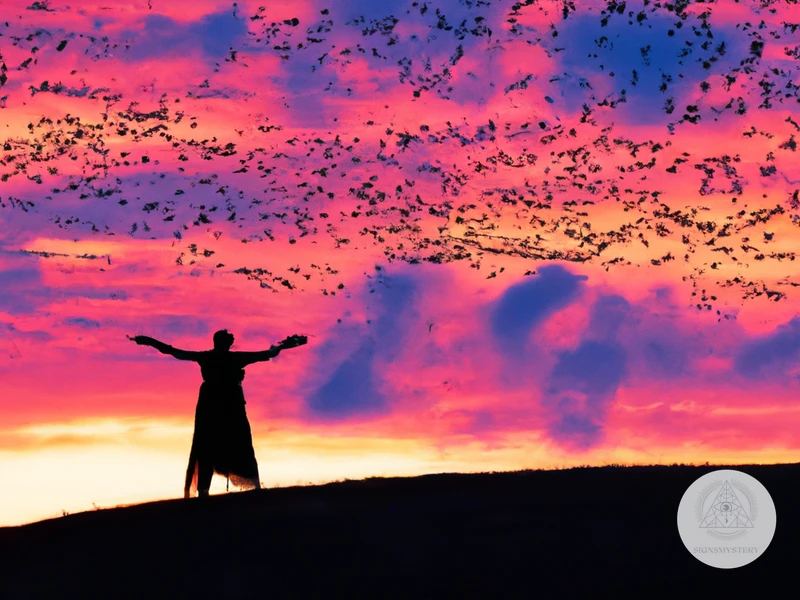
The role of the shaman in African spirituality is multifaceted, and varies depending on the specific community and tradition. However, some common functions can be identified, such as healing and medicine, divination and guidance, rites of passage, and spiritual protection and inner growth. Healing and medicine involve the shaman working with spirits and herbs to cure illnesses and promote well-being. Divination and guidance refer to the shaman’s ability to communicate with spirits and ancestors to provide insight and advice to individuals and communities. Rites of passage are ceremonies that mark significant transitions in a person’s life, such as birth, puberty, marriage, and death. The shaman plays a key role in guiding and facilitating these rituals. Lastly, spiritual protection and inner growth involve the shaman’s ability to create a sacred space, ward off negative energies, and facilitate personal and collective spiritual development.
Healing and Medicine
In African Shamanism, healing and medicine play a vital role. African shamans use various techniques to heal the physical, emotional, and spiritual ailments of individuals or communities. Shamans believe that all illnesses are caused by a disruption in the harmony between the patient’s body, mind, and soul. The shaman’s task is to restore the balance and harmony that has been lost.
Some of the techniques that African shamans use for healing and medicine are:
| Techniques | Description |
|---|---|
| Holistic Diagnosis | African shamans conduct a holistic diagnosis of the patient, which includes physical examination, listening to the patient’s history, and assessing the patient’s aura and chakras to identify the root cause of the illness. |
| Herbal Medicine | Shamans use herbal remedies to treat various ailments. They have extensive knowledge about the medicinal properties of plants and their effects on the body. |
| Divination | Shamans use divination to diagnose the patient’s condition. They may use divination tools such as tarot cards, bones, crystals, or pendulums to identify the cause of the illness. |
| Energy Healing | Shamans use energy healing techniques such as Reiki, acupuncture, acupressure, and Qi Gong to balance the patient’s energy and chakras. |
| Drumming and Dancing | Shamans use drumming and dancing to induce a trance-like state in the patient. This altered state of consciousness allows the shaman to travel to the spirit world and communicate with the patient’s ancestors and spirit guides to gain insight into the cause of the illness. |
African shamans believe that healing is a collective effort, which involves the participation of the patient, the shaman, the spirits, and the community. The patient must be willing to participate in the healing process and make lifestyle changes to restore balance and harmony.
Healing and medicine are an essential aspect of African Shamanism. African shamans use a variety of techniques to diagnose and treat illnesses, which involves restoring balance and harmony to the patient’s mind, body, and spirit. With the participation of the patient, the shaman, and the community, healing can be achieved.
Divination and Guidance
Divination and guidance are important aspects of African shamanism. The shaman uses divination to gain insight or knowledge about the past, present, or future conditions of an individual, community or the world at
Subscribe to Our Newsletter
Sign up to receive the latest news and updates.
There are various divination tools used by African shamans, such as cowrie shells, bones, tarot cards, and crystal balls. Each tool has its unique way of interpretation, and the shaman must be skilled in their usage.
The divination process involves invoking ancestral spirits to reveal knowledge or insights. The shaman may also use trance states to communicate with spirits. The goal is to understand the source of a person’s problems or their destiny.
The guidance provided by the shaman also includes healing and spiritual counseling. The shaman provides guidance to the individual on how to deal with challenges in their life, and how to connect with their spiritual nature.
In West Africa, divination is done using the Ifa divination system. This system uses 16 basic signs called odu, which are combined to form 256 odus. Each odu has a unique story or myth, and the diviner consults the oracle to determine which odu applies to the client’s situation.
In Central Africa, the divination process involves consulting the ancestors. The shaman may use drumming, dancing, or trance to communicate with the ancestors. The ancestors are believed to guide, protect, and offer wisdom to those who seek their guidance.
In Southern Africa, divination is done using channels such as dreams and visions. The shaman interprets these channels to reveal insights about the person’s life journey. The shaman may also do animal-related divination, such as reading animal tracks, using the behaviour of animals to provide guidance to the individual.
In East Africa, divination is done through a combination of trance and spirit possession. The spirit is believed to possess the shaman’s body, and this is when the spirit offers guidance and wisdom to the seeker.
Divination and guidance are crucial components of African shamanism. They offer a means of connecting with the spiritual realm and seeking knowledge and guidance. The shaman’s role in providing guidance helps individuals to navigate through challenging situations or to find direction in their life.
Rites of Passage
Rites of Passage are important events in African Shamanism and mark important transitions in a person’s life. These include birth, puberty, marriage, and death. In African cultures, such events are celebrated with great ceremony, including rituals that are meant to acknowledge the initiation, recognize the transition or change, and welcome the new phase of life.
Rites of Passage in African Shamanism
During Rites of Passage, the shaman plays a key role in guiding the participants through the various stages of the ritual. They use music, dance, and chanting to create an atmosphere that facilitates the transition. The rituals often involve purification ceremonies, such as bathing or fasting, to cleanse the individual of any impurities before they begin a new phase of life.
In some African cultures, the boys undergo a circumcision ceremony as part of their initiation into manhood. This ceremony can be physically painful, but it is meant to symbolize the boy’s courage and strength. Girls, on the other hand, undergo rituals that prepare them for womanhood, including training on how to be a good wife and mother.
The Importance of Rites of Passage
Rites of Passage serve a significant purpose in African Shamanism. They provide structure and meaning to important milestones in a person’s life. They represent the end of one phase and the beginning of another, allowing individuals to recognize the changes happening within themselves and around them. They also help foster a sense of community, as the rituals bring people together in celebration.
The Role of the Shaman in Rites of Passage
The shaman plays a crucial role in Rites of Passage. Their primary role is to guide and facilitate the transition, ensuring that the individual has a smooth and successful initiation. They may offer guidance, blessings, or advice to the individual during the ceremony. They also use their spiritual gifts to connect with the spirit world and request support from benevolent spirits.
Conclusion
Rites of Passage are crucial in African Shamanism, providing a way to recognize important milestones and easing the transition to a new phase of life. The shaman plays a key role, using their spiritual gifts to guide and support the individual during the ceremony. By acknowledging and honoring these important moments, African cultures are able to stay connected with their traditions and maintain their deep spiritual roots.
Spiritual Protection and Inner Growth
In African Shamanism, one of the key roles of a shaman is to provide spiritual protection and foster inner growth within individuals and communities. This involves connecting with the spiritual realm to help individuals gain a deeper understanding of themselves and their place in the universe.
African shamans believe that spiritual protection is essential for maintaining physical and emotional health. They use various techniques to protect individuals from negative energies, illnesses, accidents, and other harmful phenomena. Some techniques include using amulets and talismans, performing rituals, and invoking protective spirits.
In addition to protection, African shamanism also focuses on fostering inner growth. Shamans believe that every individual has a unique path of spiritual growth, and it is their duty to help individuals discover and walk on this path. Shamans use various techniques, including meditation, prayer, and divination, to help individuals gain a deeper understanding of themselves and the universe.
African shamans hold that inner growth is essential for spiritual development, and they assist individuals in achieving this growth by encouraging them to face their fears, overcome obstacles, and embrace their true identity. Hence, the shaman serves as a guide and a mentor on the journey of spiritual growth.
In African Shamanism, spiritual protection and inner growth are intertwined, and both are essential for achieving wellbeing and fulfilling one’s spiritual purpose. African shamans use various means to provide spiritual protection and foster inner growth in individuals, communities, and the world at large.
Challenges and Opportunities for African Shamanism Today
Despite its rich history and cultural significance, African shamanism faces numerous challenges in modern times. One of the most significant obstacles is the ongoing influence of imperialism and Christianity, which have served to suppress and marginalize traditional African spiritual practices. However, there is also reason for optimism as renewed interest and recognition of African shamanism is gaining momentum, particularly among younger generations. Additionally, there is potential for the incorporation of shamanistic practices into modern life, as people seek alternative methods for spiritual growth and healing. Ultimately, the future of African shamanism will depend on overcoming these challenges and embracing new opportunities for growth and adaptation.
Imperialism and Christianity
The spread of European imperialism and Christianity in Africa had a significant impact on traditional African religions, including shamanism. European colonizers viewed African spiritual beliefs, including shamanism, as backward and uncivilized, and sought to replace them with Christianity. As a result, many Africans were forced to abandon their traditional spiritual practices, including shamanism.
Christian missionaries established schools and churches in African communities, often wielding economic and political power. They also used tactics such as demonizing traditional beliefs and practices, confiscating sacred objects, and punishing those who continued to practice traditional religions. Many Africans were coerced into converting to Christianity and abandoning their traditional spiritual beliefs, including shamanism.
The impact of imperialism and Christianity on shamanism in Africa was not uniform, however. In some cases, the two coexisted and even blended. For example, in parts of southern Africa, Christian missionaries incorporated traditional spiritual practices, including shamanism, into their teachings and practices. This blending of Christianity and shamanism is known as syncretism.
Today, many Africans are rediscovering their traditional spiritual practices, including shamanism, and seeking to reconnect with their ancestors and spirits. There is also a growing movement to reclaim African spiritual traditions and to reject the imposition of European imperialism and Christianity. Despite the challenges posed by imperialism and Christianity, shamanism continues to play an important role in African spirituality and culture.
Renewed Interest and Recognition
In recent years, there has been a renewed interest and recognition of African shamanism both on the African continent and in other parts of the world. This interest is driven by a growing awareness of the value of traditional practices in maintaining an individual’s connection to their cultural heritage and spirituality.
One of the driving forces behind this renewed interest in African shamanism is the recognition of its potential as a source of healing and personal growth. As more people seek alternatives to Western medicine and psychology, many are turning to traditional shamanic practices to achieve greater well-being and balance.
Additionally, scholars and researchers are showing increased interest in African shamanism as a field of study. This has led to greater academic attention and resources being devoted to understanding the spiritual practices and cultural significance of shamanism in Africa.
Africa’s growing presence on the global stage has led to greater international recognition and celebration of its cultural heritage. This has opened up new opportunities for African shamanism to be shared and celebrated around the world.
This renewed interest and recognition of African shamanism is not without its challenges, however. Some traditional practitioners worry about the dilution of their cultural practices and the risk of exploitation by outside interests. Others caution against cultural appropriation and the commodification of spiritual practices.
The renewed interest and recognition of African shamanism presents both opportunities and challenges for traditional practitioners and scholars alike. As long as these practices are respected and approached with humility and open-mindedness, they have the potential to benefit individuals and communities around the world.
Incorporation into Modern Life
Incorporating shamanism into modern life has been a challenge for many who practice or seek to integrate it into their daily lives. One challenge is that shamanism is not a formalized religion or doctrine that can be easily transferred to modern life. It is deeply rooted in community, nature, and the wisdom of ancestors. As such, it can be difficult to adapt to the individualistic and technologically-driven modern way of life.
However, shamanism still has much to offer in our modern world. It offers a deep sense of connection with oneself, others, and the natural world. Additionally, many shamanic practices can be combined with modern technologies and practices to create a unique and meaningful spiritual practice.
One way shamanism has been incorporated into modern life is through the use of technology such as online communities. These communities offer a way for people to connect with each other and share shamanic practices and teachings. They can provide support and resources to those seeking to incorporate shamanism into their lives. Online resources like Shaman Portal and Shamanic Teacher offer a wealth of information and resources.
Another way shamanism has been integrated into modern life is through the use of plants and herbal remedies. Many modern drugs and treatments have been derived from traditional shamanic knowledge of plants and their properties. The use of plant medicines is becoming more mainstream and accepted in the scientific and medical communities.
Additionally, shamanic practices are finding their way into modern therapy practices, including shamanic journeying, where a person enters an altered state to communicate with spirits or ancestors. This can be used to gain insights and guidance to overcome emotional or psychological issues.
Finally, shamanic practices are also being incorporated into modern ecological and environmental movements. Many indigenous environmental activists use shamanic practices to connect with nature and fight for protect indigenous lands and cultures.
While the incorporation of shamanism into modern life presents challenges, the opportunities and benefits it offers are vast. By combining ancient wisdom with modern practices and technologies, shamanism can offer a powerful tool for personal growth, healing, and spiritual connection.
Conclusion
In conclusion, African shamanism has a rich history, diverse cultural practices, and an important role in African spirituality. The practice has survived centuries of external influences, including colonization, Christianity, and modernization. Today, African shamanism faces both challenges and opportunities. On the one hand, it must combat the ongoing effects of imperialism and cultural erasure, which have caused the loss of traditional knowledge and practices. On the other hand, there is a renewed interest and recognition of the value of African spirituality, which has helped to revive and preserve shamanistic traditions.
Despite these challenges, African shamanism has the potential to offer a powerful contribution to modern society. Many people are seeking alternative spiritual practices and a deeper connection with their ancestors and the natural world. African shamanism offers a unique perspective and set of tools for engaging with these elements of the human experience.
Moving forward, it is important to acknowledge and honor the indigenous African cultures and knowledge systems from which shamanism arises. This includes supporting the preservation of traditional practices and supporting the revitalization of endangered traditions. It also involves respectfully engaging with these practices, learning from indigenous teachers, and avoiding appropriating the practice for personal gain.
Overall, African shamanism offers a profound and transformative approach to spirituality, healing, and personal growth, rooted in a deep reverence for the natural world and our ancestors. By embracing and honoring these traditions, we can gain valuable insights and tools for navigating the complexities of modern life while honoring the ancient wisdom of our ancestors.
Frequently Asked Questions
What is African Shamanism?
African Shamanism is a spiritual practice that involves the connection with ancestors, spirits, and the natural world. It is a way of understanding the universe and a way of life that originated in Africa and has been practiced for thousands of years.
What is the role of the shaman in African spirituality?
The shaman in African spirituality plays a crucial role in healing, divination, guidance, and protecting the community. They are the intermediaries between the physical and spiritual worlds, and they use their gifts to help others.
What are the origins of African Shamanism?
The origins of African Shamanism can be traced back thousands of years to ancient Egypt. Shamanism evolved through the different regions of Africa, with each culture adding their unique beliefs and practices.
What are the different types of African Shamanism?
African Shamanism can be categorized into four different types: West African, Central African, South African, and East African, each with their unique beliefs and practices.
What is the importance of ancestors and spirits in African Shamanism?
Ancestors and spirits are essential in African Shamanism because they are believed to be intermediaries between the physical and spiritual worlds. They guide and protect the living, and their wisdom is sought through divination and other healing practices.
What is divination, and how does it work in African Shamanism?
Divination is the practice of seeking knowledge through supernatural means. In African Shamanism, divination is used to seek guidance from spirits and ancestors and make informed decisions about the future. It involves different tools and techniques like throwing bones or interpreting dreams.
What is the role of African Shamanism in modern society?
African Shamanism plays a crucial role in modern society as more people seek guidance from non-traditional sources. It provides a way of reconnecting with one’s roots, with nature, and with the spiritual world.
What are some of the challenges facing African Shamanism today?
The challenges facing African Shamanism today include cultural imperialism, where traditional practices are demonized or outlawed in favor of more westernized beliefs. Modernization and a lack of interest from younger generations are also posing a threat to the practice.
How can non-Africans practice African Shamanism?
Non-Africans can practice African Shamanism by learning about the different cultures and their beliefs and incorporating them into their spiritual practice. It requires respect for the traditions and a willingness to learn from those who practice it.
How can African Shamanism be incorporated into modern life?
African Shamanism can be incorporated into modern life by understanding its fundamental principles and adapting some of the practices to suit modern needs. Meditation, connecting with nature, and seeking guidance from spirits and ancestors are some ways to incorporate African Shamanism into modern life.



